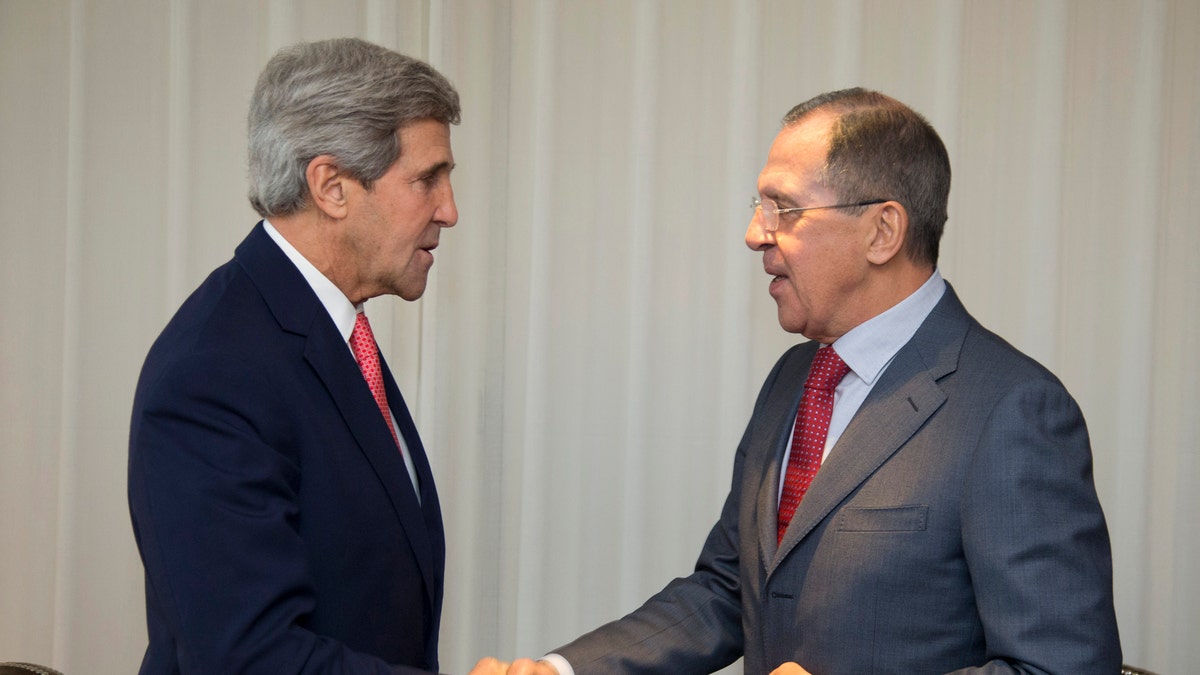
Nov. 23, 2013: U.S. Secretary of State John Kerry (L) and Russia's Foreign Minister Sergei Lavrov shake hands during a photo opportunity prior to their meeting, in Geneva. (REUTERS)
In what some perceive as a sign of optimism in nuclear talks with Iran, Secretary of State John Kerry arrived in Geneva on Saturday to lend his weight to the negotiations, as Western diplomats reported progress in the talks to curb Tehran's nuclear program.
State Department spokesperson Jen Psaki said late Friday that Kerry was heading to Geneva "with the goal of continuing to help narrow the differences and move closer to an agreement."
Western envoys previously saw it as a positive sign that Kerry was tentatively planning to attend, a Reuters report said. Still, the State Department appeared to keep expectations limited and said Kerry's appearance was "not a prediction of the outcome."
French Foreign Minister Laurent Fabius was the first to arrive Saturday, joining senior negotiators struggling to seal a deal that would see Tehran start to roll back its atomic activities in exchange for sanctions relief.
Iran's claim to a right to produce nuclear fuel apparently is a key sticking point. Iranian Foreign Minister Mohammad Javad Zarif and Catherine Ashton, the European Union's top diplomat, have met repeatedly since Wednesday trying to resolve that and other differences.
Kerry had a 20-minute meeting with Ashton and his Russian counterpart, Sergey Lavrov.
Ashton is convening the negotiations, and protocol dictates that foreign ministers come only at her invitation.
Ashton's spokesman Michael Mann said she did not issue any invitations this time. That suggested that a deal was not yet in the cards and that Lavrov was in Geneva at his own initiative.
Germany's Guido Westerwelle spoke of "a realistic chance, but there is still a lot of work to do." Ryabkov told the RIA-Novosti news agency that negotiations were very close to a breakthrough but "unfortunately I cannot say that there is assurance of achieving this breakthrough."
France's Fabius told reporters he wanted "a deal -- but a solid deal -- and I am here to work toward that end."
The last round of talks between Iran and the six world powers ended Nov. 10 with no deal even after Kerry, Lavrov, the foreign ministers of Britain, France and Germany and a Chinese deputy foreign minister flew in and attempted to bridge differences.
Zarif and Ashton met briefly Friday for talks that Iran's official IRNA news agency described as "complicated and tough." It quoted Iranian Deputy Foreign Minister Abbas Araghchi in Geneva as saying that Iran's right to uranium enrichment must be part of any deal.
Iran says it is enriching only for reactor fuel, medical uses and research. But the technology can also produce nuclear warhead material.
Zarif last weekend indicated that Iran is ready to sign a deal that does not expressly state Iran's right to enrich, raising hopes that a deal could be sealed at the current Geneva round.
On Wednesday, however, Iran's supreme leader, Ayatollah Ali Khamenei, said his country would never compromise on "red lines." Since then Tehran has reverted to its original line - that the six powers must recognize this activity as Iran's right under the nuclear Nonproliferation Treaty despite strong opposition by Israel and within the U.S. Congress.
A senior Iranian negotiator said that the Iranian claim did not need to be explicitly recognized in any initial deal, despite Khamenei's comment. He did suggest, however, that language on that point remained contentious, along with other differences. He demanded anonymity because he was not authorized to discuss the diplomatic maneuvering.
Sanctions relief was also an issue.
The United States and its allies have signaled they are ready to ease some sanctions in return for a first-step deal that starts to put limits on Iran's nuclear program. But they insist that the most severe penalties _ on Tehran's oil exports and banking sector _ will remain until the two sides reach a comprehensive agreement to minimize Iran's nuclear arms-making capacity.
Iran says it does not want such weapons and has indicated it's ready to start rolling back its program but wants greater and faster sanctions relief than that being offered.
Several senators, both Democrat and Republican, have voiced displeasure with the parameters of the potential agreement, arguing that the U.S. and its partners are offering too much for something short of a full freeze on uranium enrichment.
Senate Majority Leader Harry Reid said Thursday that he would support legislation to expand sanctions against Iran, though he said he also backs the negotiating effort. Reid said the threat of more sanctions was essential to get an acceptable deal.
Sen. Bob Corker, the Republicans' top member on the Senate Foreign Relations Committee, on Thursday proposed a bill outlining a final agreement, including an end to all Iranian enrichment activity, and seeking to restrict President Obama's capacity to ease sanctions.
Fox News' Edmund DeMarche, Barnini Chakraborty and The Associated Press contributed to this report







































